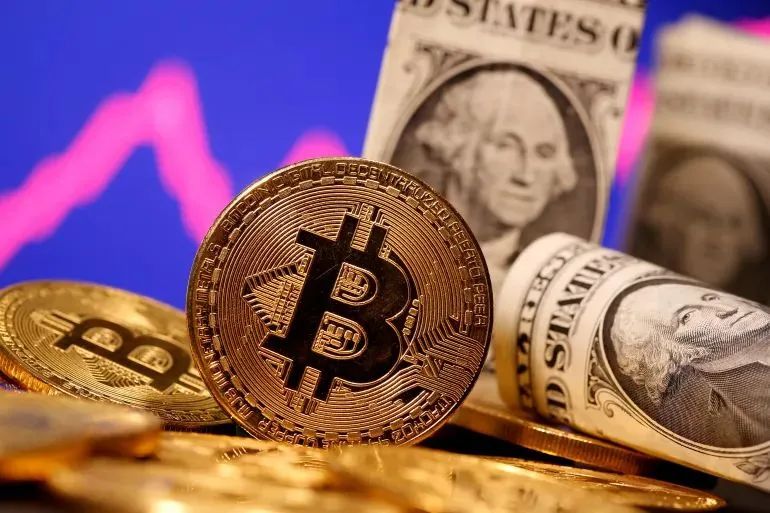Author | Mu Mu
Produced by | Plain Language Blockchain
For many years, a saying has circulated in the crypto space: "The biggest risk of Bitcoin is not being able to hold it." Essentially, "not being able to hold it" is a matter of cognition and information asymmetry. Since the birth of Bitcoin's genesis block, 16 years have passed, and many people still feel that Bitcoin is "ethereal" and are deeply concerned. Rather than discussing "what is the biggest risk of Bitcoin," it might be more pertinent to explore whether people's greatest worries about Bitcoin's existence are indeed unnecessary…
01. The "Virtual" Nature of Crypto Assets
Bitcoin and other crypto assets have long been categorized by some in the crypto community as "virtual" assets, a classification that is viewed negatively. When people hear the term "virtual," it naturally evokes a sense of something "elusive," which doesn't seem "formal" or "serious." Therefore, opponents hold the view that virtual assets lack credit backing; currency must be based on credit and physical exchange, and virtual assets are ultimately just a dream.
The reason this viewpoint has taken root is that there is some rationality to it. According to common sense, whether it is the US dollar or the Japanese yen, they are backed and guaranteed by the national credit of the United States and Japan, which provides stable purchasing power. Crypto assets, whose origins are unknown, naturally lack these guarantees, making it difficult to trust them.
In fact, this viewpoint overlooks the technological value behind crypto assets and fails to understand what "consensus" really means. Concepts like blockchain technology, Web3, and decentralized finance have already demonstrated their practical application value in global payment and settlement fields. More importantly, the value "consensus" behind crypto assets is essentially the same as the consensus generated by credit backing.
The reason currency needs credit backing is that human social structures are complex and require a unified, powerful centralized organization to act as a credit intermediary to provide a basis for consensus. In contrast, decentralized entities, like gold or stones in a river, have their physical properties as their natural consensus. Even without national credit backing, in everyone's consensus, stones are hard, and gold is always shiny, does not rust, and is valuable. This is also why ancient human societies could use shell money, stone money, and gold as currency.
In short, whether something has value is not determined by whether it has credit backing, but rather by the consensus it holds.

02. A Tool for Harvesting by the US?
In recent years, as the global financial center, the United States has gained increasing influence over crypto assets. Not only are crypto assets priced in US dollars, but the crypto asset spot ETFs listed on US stock exchanges have also attracted hundreds of billions in funds. Many US-listed companies and financial institutions hold Bitcoin, and the newly elected president is also keen on leveraging the advantages of US crypto assets.
As the US exerts greater regulatory control over Bitcoin and other crypto assets, as well as the upstream and downstream of the market industry, people have begun to worry and even believe that this could become another tool for the US to harvest the world, just like the dollar.
This concern is not without reason; the greater the influence, the more it can sway the crypto market, making it easy for global retail investors to be "harvested." Referring to the previous logic of US harvesting, the US has attracted global funds into the virtual currency market through financial innovation and dollar hegemony. If crypto asset prices plummet, it could ultimately lead to capital flowing back into dollar assets, which indeed aligns with the logic of "dollar harvesting" to some extent.
Of course, this concern also has its limitations, as Bitcoin, Ethereum, and other crypto assets are not initiated and dominated by the US. They are more driven by grassroots forces through technological innovation from the bottom up. Capital from Wall Street and elsewhere in the US only began to enter the space after Bitcoin and other crypto assets matured, so this cannot be considered a premeditated "conspiracy" by the US but rather a field born from technological development and market demand.
Additionally, public blockchains like Bitcoin and Ethereum are technically unlikely to be controlled. Even if some mining pools and service providers are based in the US, their distributed nodes are spread across the globe. Even if US authorities can regulate or restrict local nodes from reviewing transactions, overseas nodes can still submit and publish transactions. It's akin to gold mines scattered around the world; local authorities can order local mines to cease operations, but they cannot command or influence the operations of mines in other regions.
Furthermore, the reason the US can harvest globally through dollar hegemony is due to its absolute control over the dollar. But can the US control Bitcoin in the same way? No, it cannot. However, the US can dominate Bitcoin like it does with mainstream global assets such as gold and oil.
Conversely, the US can marginalize Bitcoin to some extent within a specific range, but it cannot kill it (if it could, it would have died hundreds of times by now). Of course, considering the intertwined interests, the US is unlikely to act against its own interests and sacrifice Wall Street capital, at least not before it detaches from its own interests.

03. Financial Inequality and Infinite Issuance?
Some say that compared to early participants, it is unfair for ordinary people today. This is what many refer to as financial inequality. In reality, the Bitcoin network and community information are open and fair; as a public blockchain, it lies there like a public resource. Anyone can access the information and submit transactions to its network; it’s just that some people are unwilling to understand and accept new things and do not want to take a step forward.
Others argue that Bitcoin's cap of 21 million does not exist because its smallest unit, the satoshi, makes it almost infinite.
This is a somewhat strange viewpoint; changes in units have no relation to total quantity. 1 liter of water is enough for 1 person to drink; it cannot be said that having 1000 milliliters means it can be shared among 1000 people. The unit changes, but the total quantity remains unchanged.
04. Conclusion
In summary, most people's "opposition" to Bitcoin is largely due to misunderstanding. The "virtual" era has become a thing of the past; from being an insignificant "minor player" to becoming a mainstream asset, Bitcoin's consensus and status have become increasingly solid over the past 16 years, gaining the strength to compete with gold. The strong intervention of the US does not currently seem to be a bad thing, but there are still many uncertainties, and we must guard against significant fluctuations. I still believe that crypto and AI will jointly lead the reshaping of the future in the digital age.
免责声明:本文章仅代表作者个人观点,不代表本平台的立场和观点。本文章仅供信息分享,不构成对任何人的任何投资建议。用户与作者之间的任何争议,与本平台无关。如网页中刊载的文章或图片涉及侵权,请提供相关的权利证明和身份证明发送邮件到support@aicoin.com,本平台相关工作人员将会进行核查。



